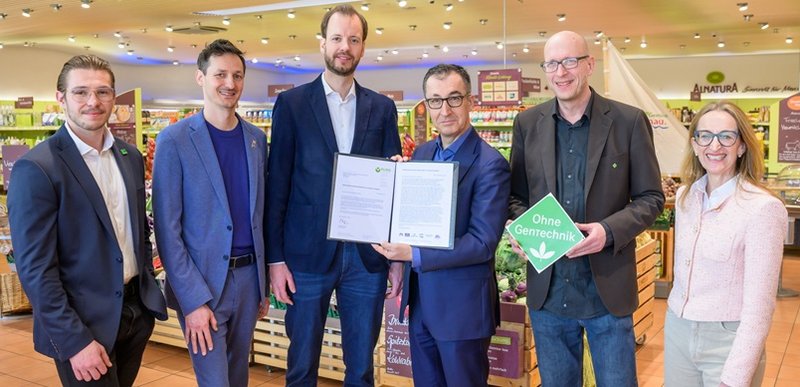News
Özdemir supports demands for freedom of choice and coexistence
On behalf of the businesses initiative, Lucas Rehn, member of the Alnatura Executive Board, handed over the letter, supported by 376 food businesses from 16 EU countries, to Minister Özdemir at an Alnatura store in Stuttgart-Zuffenhausen. In addition to mandatory labelling and traceability, the signatories demand EU-wide binding, nationally and regionally adapted coexistence measures, liability regulations in accordance with the polluter-pays principle, a compensation fund for unavoidable contamination and an obligation for genetic engineering businesses to provide detection methods for the market launch of plants derived from new genetic engineering (NGT).
Özdemir: Initiative is a good and important signal
Federal Minister of Agriculture Cem Özdemir said at the letter handover: "It is a good and important sign that so many businesses are actively committed to enabling consumers to make a conscious decision in favour of products without genetic engineering in the future. I am convinced that anyone who wants to farm GMO-free must be able to continue to do so - without additional hurdles. In addition to the precautionary principle, three points are key when dealing with new genomic technologies: coexistence, transparency and freedom of choice at all stages. The issue of patentability must also be resolved.
At EU level, it has not yet been possible to achieve an acceptable balance of interests between consumers, food producers, manefacturers and retail when dealing with NGTs. The latest initiative by the Polish Council Presidency also does not contain sufficient improvements on the key issues of coexistence, transparency, freedom of choice and patentability.
In the further procedure, I am still counting on a clarification of the open questions and improvements for a fair, practicable and socially accepted regulation of plants produced using the new genomic techniques - and which, at the same time, continues to guarantee freedom of research. We will continue to campaign for this in Brussels in the coming weeks and months."
Entrepreneurs describe to Özdemir concrete effects of genetic engineering deregulation
After the letter was handed over, representatives of the businesses Alnatura, Alb-Gold, dm and Huober described the consequences of deregulating EU GMO legislation for their businesses to the Federal Minister in concrete terms and explained their political demands to him during tours of the Alnatura and dm stores.
Kerstin Erbe, Managing Director for Product Management and Sustainability at dm-drogerie markt, explained her support for the traceability of genetic engineering, freedom of choice in front of the shelves and fair competition in the European retail sector: "For the people at dm, it is about nothing more and nothing less than transparency and freedom of choice, about ensuring that mandatory labelling of all genetically modified foods - including new genetic engineering - enables citizens to consciously consume a range of organic foods that is accessible to everyone."
Alnatura founder Götz Rehn clarified: "By law, the use of genetic engineering is prohibited in organic farming. In the future, this must also apply to so-called new genetic engineering. For coexistence and fair competition between the various concepts, it is essential that customers can reliably recognise the difference through mandatory labelling. We categorically reject the use of new genetic engineering in organic farming."
Arlend Huober, Managing Director of Huober Brezel, emphasised: "If something contains genetic engineering, it must be labelled as such. This must continue to remain so. Customers have a right to transparency and freedom of choice. The burden of proof, traceability, and liability issues must be bindingly and unequivocally placed on the originator. It is unacceptable that enterprises that produce organic food in the interests of a sustainable food industry should be penalised by the new legislation."
Oliver Freidler, Managing Director of the family-run business Alb-Gold Teigwaren, encouraged Özdemir to stand up for consumer protection: "Freedom of choice in front of the shelf is a valuable asset. Our customers want to know what is in the spaetzle and noodles from Alb-Gold. That's why the labelling requirement for foods containing genetically modified ingredients must remain in place."
Urgent appeal: Include mandatory GM labelling in Council position!
The procedure initiated by the EU Commission to deregulate new genetic engineering (NGT) has been running since July 2023. The European Parliament adopted its position on this subject in 2024. Only the Council of Agriculture Ministers, which represents the EU Member States, has not yet reached an agreement. The companies have therefore addressed their second Open Letter to this body.
Since the beginning of 2025, the current Polish Council Presidency has been pushing for a swift compromise. However, the current proposal still lacks solutions for coexistence, transparency and freedom of choice. A continuous labelling obligation across the entire value chain up to the end product is not yet envisaged - unlike in the parliamentary position. It would be disastrous if this half-baked proposal were to be hastily adopted as the Council of Ministers' position for the subsequent trilogue negotiations in a technical committee of representatives in Brussels on 14 March 2025, largely excluding the public.
The businesses are therefore appealing to Minister Özdemir to use his influence to first add the necessary points and only then agree on a common position at political level in the Council of Ministers.
Open Letter: Supporters
The Open Letter is an initiative of the German businesses Alb-Gold Teigwaren GmbH, Alnatura Produktions- und Handels GmbH, Andechser Molkerei Scheitz GmbH, Milchwerke Berchtesgadener Land Chiemgau eG, dm-drogerie markt GmbH + Co KG, Frosta Tiefkühlkost GmbH. These businesses are supported by several industry associations: The German Association for Food without Genetic Engineering (VLOG), European Non-GMO Industry Association (ENGA), Germany’s leading organic farming association Bioland, the Association of Organic Food Producers (AöL) and the German Association of Natural Food Natural Products (BNN).
Open Letter to Cem Özdemir (German)

